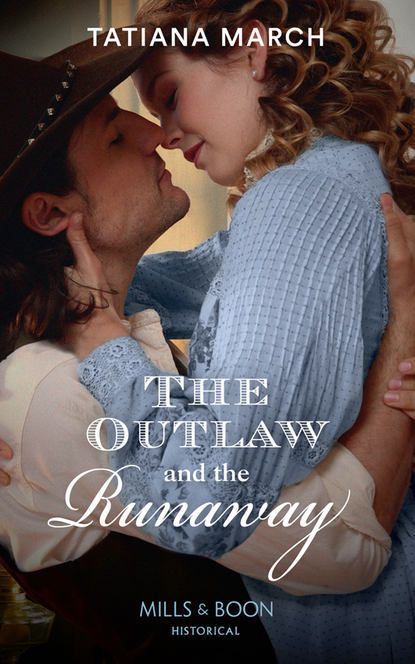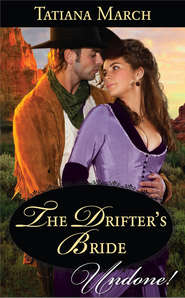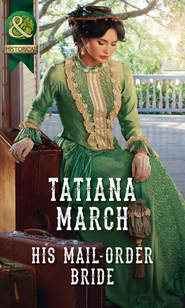По всем вопросам обращайтесь на: info@litportal.ru
(©) 2003-2024.
✖
The Outlaw And The Runaway
Настройки чтения
Размер шрифта
Высота строк
Поля
Straightening on his feet, Roy headed for the stable, a small timber construction with a sloping roof. He peered in through the open doorway. No smell of manure. The stable must have been unoccupied for some time, and yet from inside came the frantic buzzing of flies. Roy pulled his eye patch aside to see better in the dark and stepped into the cool shadows of the interior.
In the corner of a stall, he found a burlap sack that gave out rancid odors. He looked around, spotted an old broom and used the handle to poke at the sack. Flies dispersed with an angry buzz. Empty tin cans rolled out, metal waste that could not be burned in a stove. The labels were still clear enough to read, indicating that the tins couldn’t have been there for long. Roy bent closer to study the labels.
Borden’s Evaporated Milk
Van Camp’s Pork and Beans
Winslow’s Green Corn
Satisfied with the results of his search, Roy left the flies to their feast. Outside, he paused to survey the house. A curtain twitched in an upstairs window. Not letting on he’d noticed, Roy ambled back to the front, untied his horse and walked away, mulling over the situation.
Had the girl too been in on the robbery? Had she known all along, perhaps even persuaded her father to become involved? The current between them that he’d taken as an attraction between a man and a woman, had it been something else on the girl’s part? Had it been a bond between two coconspirators in a crime?
Tension held Roy in its grip, new possibilities tumbling around in his mind. All his years on the outlaw trail, he’d dreamed of a home, of an honest life, of belonging in a place, of being equal to other men, able to hold his head high in public. But if he could not have that, could he have what Lom Curtis and Burt Halloran had—a woman who belonged to him, if for no other reason than she had little choice?
Once more, Roy tied his horse to the hitching rail outside the mercantile and went in. He found the clerk crouched between the aisles, refolding a stack of shirts a customer had left in disarray.
“I need a spare horse,” Roy said, offering no explanation. “Where can I get one?”
The clerk pushed up to his feet. Something flickered in his eyes, perhaps relief. “Ike Romney, who owns the livery stable, has a few horses he rents out. There’s a dapple-gray mare Miss Courtwood rented occasionally, with a Mother Hubbard saddle. Romney has a sidesaddle for ladies but Miss Courtwood favored riding astride.”
“That’s interesting to know.” Roy kept his tone bland. “I might need a bedroll and a couple of blankets, too, and an extra pair of saddlebags.”
The clerk sauntered along the aisle, all business now. “Romney sells saddlebags, and we don’t like to step on each other’s toes, but I’ll set you to rights on a bedroll and blankets. Give you a good price, too.” He pulled out a pink blanket in soft wool. “How about this one?”
Roy took a step back, dismissing the question. “You choose. I’ll go and see about a horse and come back.”
He left the store, walked over to the livery stable on the edge of town where a few horses pranced around in a pole corral. After a quick negotiation, Roy bought the dapple-gray mare for forty dollars and the nearly new Mother Hubbard saddle for another fifty, with a bridle and a pair of saddlebags thrown in.
He led the mare back to the mercantile, tied her next to Dagur at the hitching rail and went inside the store. The clerk presented him with a neatly wrapped bedroll and two sturdy canvas bags with something packed inside them. “It’s five dollars for the bedroll,” the storekeeper informed Roy. “I put in two blankets, the expensive kind that don’t itch so much.” He held up the canvas bags. “These are useful to line the saddlebags. Easy to unpack, you can just lift out the contents.” Looking awkward, the old man added, “I put in a few odds and ends that might come in useful. No charge. The contents are on the house.”
Roy settled his bill. When he gathered up his purchases, the clerk spoke quietly. “Don’t forget what I said, stranger. Every man has at least one use for a woman. If that is what you have in mind, do right by her. Make her into a wife.”
Roy pretended not to hear. Outside, he paused to peer into the canvas bags, to see what doo-dahs the storekeeper had provided. Hairbrush. A cake of French milled soap. Small mirror. Hair ribbon in pink silk. Tooth powder. Toothbrush. A length of white muslin, something a woman might use to protect her face from dust while riding the desert trails.
With a sudden pang of nostalgia, Roy realized he’d not come across such feminine items since he was ten years old and his mother died. Closing his mind to the past, he loaded the goods on the dapple-gray mare, mounted Dagur and rode out of town at a slow walk, leading the mare by the bridle. He’d wait until dark. The girl must have a reason why she wanted to hide, and he would respect her desire to remain unseen.
* * *
Celia eased the back door ajar and slipped out into the cool darkness of the September night. The scents of lavender and yellow sweet clover and blue passionflower surrounded her. In the bleakness of her life, her precious garden remained the only source of comfort. Soon the apples would be ripe enough to eat and the potatoes and carrots ready to harvest, and she could supplement her unappetizing diet of tinned goods and oatmeal porridge.
“Good evening, Miss Courtwood.”
Nothing had alerted her to the man’s presence—no snap of a twig beneath the sole of a boot, no clatter of hooves on the street outside, no nervous whinny of a horse tied to the porch railing. Why had he searched her out? And why had he come back now? Earlier, when he’d knocked on her door and toured the garden, Celia had longed to hurry downstairs and stop him from leaving, but the battle of conflicting emotions within her had kept her frozen by the bedroom window, where she had watched him from behind the lace curtains.
“Why did you come?” she asked, staring into the shadows beneath the apple tree.
“The name’s Roy Hagan, Miss Courtwood. Sorry I didn’t tell you before.”
“What are you doing here?” Her voice quivered, revealing her agitation. She battled the urge to hurl herself against his chest, to scream out her loneliness and confusion and rage. If she did, he might pull her into his arms and she could lay her head upon his shoulder and let the tears locked inside her flood out in a purifying stream that might ease her misery.
But she did none of it. Years of tiptoeing around her mother’s sickbed and a lifetime of trying not to add to her father’s woes had taught Celia to contain her emotions, to act with a serene dignity. Right now, the silent clenching and unclenching of her fists at her sides was the only sign of the turmoil that went on inside her head.
Beneath the huge, gnarled apple tree, the shadows shifted, separated and became a man. Standing in the moonlight, dressed in black trousers and a dark shirt, the brim of his hat tugged low, the man looked part of the night. He had uncovered his left eye, leaving the padded cotton patch dangling around his neck by its rawhide strap.
“Can we talk inside?” he asked. Without waiting for an answer, he closed the distance between them, took her by the elbow and ushered her back into the house.
It was barely a touch, his fingers resting lightly against her arm, but even through the fabric of her dress, Celia could feel the warmth of his skin, could feel the strength in him. It sent an odd shiver through her, that physical contact. It was the first human closeness she had experienced since the sheriff hauled her father away, and it made her feel as if a glass wall around her was shattering, exposing her to life again.
At the rear door, the man fell back, allowing Celia to enter first. The kitchen was small, with a row of white-painted cabinets beneath the window and a square table with a pair of chairs along the opposite wall. She’d opened the shutters to let in the moonlight, but she had not yet lit the stove. To cook her supper, she preferred to wait until past midnight, when the thin column of smoke through the chimney had a better chance to remain unnoticed.
Celia waited for Roy Hagan to step across the threshold and close the door behind him. Then she faced him, making no effort to hide her scar by turning to one side. Her fingers fisted into her calico dress—she’d abandoned her rustling skirts and layers of petticoats—and for the third time she asked, “Why are you here?”
“I came to see if you are all right, Miss Celia.”
Just like that, he had taken the liberty of calling her by her given name. Even though no one called her Miss Courtwood, apart from Mr. Northfield and Mr. Selden, both sticklers for formality, the sound of her name on the stranger’s lips and his intrusion into the safety of her kitchen put another crack into Celia’s rigid self-control.
“I wish you hadn’t come,” she blurted out.
“No, you don’t, Miss Celia,” he replied. “You’re glad I’m here.”
There was no arrogance in the man’s tone, only understanding and compassion. Knowing that he had spoken the truth caused the gates of restraint to fling wide-open inside Celia.
“How can I be glad that you’re here?” The words poured out of her, but despite her agitation, her voice didn’t rise from its even pitch. “You may have protected my father, saved him from a bullet, but had you not robbed the bank in the first place he would not have been put in danger. You were the danger and the rescue, the peril and the protection. I owe you no gratitude for saving him from a danger you brought upon him yourself.”
She paused to draw a breath, then went on with a burst of anguish. “What eats me up inside is that I knew what you were planning to do. Secretly, I gloated over my cleverness, having figured out that you’d come to rob the bank, and I did nothing to stop you. Nothing.” She stared at him, a plea in her eyes. “Do you understand how that makes me feel? I could have stopped it, but I didn’t, because I wanted to pay back the town for ostracizing me.”
“Don’t beat yourself up so, Miss Celia.”
“Beat myself up?” A bitter groan wrung from her. “You haven’t heard the half of it. The bank manager, Mr. Northfield, got it into his head that my father had been in cahoots with the robbers, and he shared his suspicions with the sheriff. My father refused to defend himself, and now he is serving five years in Yuma prison. He’ll die in prison, alone and neglected, for nothing but the noble misconception that by accepting the blame he’ll set me free, relieve me of the burden of supporting him while he grows too weak to work.”
Tears burned in Celia’s eyes but she refused to let them fall, just as she had refused to let them fall during the long years of her mother’s illness, or when every birthday trapped her deeper into spinsterhood, with no prospect of love, no prospect of a family and home, nothing but loneliness and the struggle to earn her living looming in the future.
“And you know what, Mr. Hagan?” Celia let the words form on her tongue, admitting to the guilt that pressed like a vise against her chest. “Deep down inside me there is this awful feeling of relief.” She lifted her chin in a gesture of defiance. “So don’t tell me that I must not beat myself up. I contributed to placing my father in danger, and when he takes on the blame for a crime he didn’t commit, I feel relief because it spares me the trouble of nursing another dying parent and leaves me with only my own mouth to feed.”
* * *
Always on guard, Roy observed his surroundings while he listened to the girl unburden her mind. Again, the long-forgotten smells tugged at his memory—crisp, clean laundry, flowers in a vase on the table, the lingering scents of home cooking.
Celia’s last words pulled him back to the present. Earlier, he’d wondered if she had been in on the crime, but it had never crossed his mind that she might believe her father to be innocent. Rapidly, he reviewed all the possibilities. No. It could not be. Everything pointed to the man’s guilt, including what the girl had just explained. Roy opened his mouth to speak, closed it again. He didn’t want to be the one to tell her the truth.
“Why are you hiding?” he asked.
Barely had his voice faded away when a thud echoed from the front of the house. In a flash, the heavy Smith & Wesson revolver appeared in Roy’s hand. On soundless feet, he inched past the girl and opened the connecting door to the parlor.
“Don’t.” She reached out and tugged at his arm. “It’s just youngsters. They throw clumps of manure at the house. It does no harm.” When Roy glanced back at her, he could see a shadow of a smile hovering around her mouth. “Manure is good fertilizer for my garden. Saves me from sneaking out to the hitching rails on Main Street to collect some.”
He returned his gun to the holster, eased back into the kitchen and closed the door to the parlor. Before he had a chance to collect his thoughts, the girl burst into speech again.











